#the phrase ''foundation of a nation'' is also quite satisfying to sing
Explore tagged Tumblr posts
Text
If I do ever finish my DSMP/L'Manburg parody of American Pie (from Tommy's POV) would y'all wanna listen? Because god knows the lyrics have been rotating in my brain for months and after what I've heard about the finale, I think we need some quality content in the DSMP fandom
#I'd add a poll if I could but by god Tumblr hasn't gifted that to me yet#DSMP#L'Manburg#Pixiemage Sings#<- I think that's my tag???#tommyinnit#there are amazing lyrics in this thing okay#I managed to rhyme ''retribution'' with ''revolution''#I wrote in multiple references to actual quotes#the phrase ''foundation of a nation'' is also quite satisfying to sing#AND I WANNA GET ART DONE FOR IT#LIKE I REALLY WANT TO COMMISSION SOMEONE#to do some simple-ish art for each verse#with stuff on the edges and a blank-ish area in the middle for lyrics#and it's all from Tommy's POV during exile#so - anyway I have ideas for this project#I just need to pull it together if folks are interested
14 notes
·
View notes
Text
The Twenty-first Sunday in Ordinary Time
Roman Catholic Proper 21 Revised Common Lectionary Proper 16
Complementary Hebrew Scripture Lesson from the Latter Prophets: Isaiah 58:9b-14
If you remove the yoke from among you, the pointing of the finger, the speaking of evil, if you offer your food to the hungry and satisfy the needs of the afflicted, then your light shall rise in the darkness and your gloom be like the noonday. The Lord will guide you continually, and satisfy your needs in parched places, and make your bones strong; and you shall be like a watered garden, like a spring of water, whose waters never fail. Your ancient ruins shall be rebuilt; you shall raise up the foundations of many generations; you shall be called the repairer of the breach, the restorer of streets to live in.
If you refrain from trampling the sabbath, from pursuing your own interests on my holy day; if you call the sabbath a delight and the holy day of the Lord honorable; if you honor it, not going your own ways, serving your own interests, or pursuing your own affairs; then you shall take delight in the Lord, and I will make you ride upon the heights of the earth; I will feed you with the heritage of your ancestor Jacob, for the mouth of the Lord has spoken.
Semi-continuous Hebrew Scripture from the Latter Prophets: Jeremiah 1:4-10
Hebrew Scripture Lesson from The Latter Prophets: Jeremiah 1:4-10
Now the word of the Lord came to me saying,
“Before I formed you in the womb I knew you, and before you were born I consecrated you; I appointed you a prophet to the nations.”
Then I said, “Ah, Lord God! Truly I do not know how to speak, for I am only a boy.” But the Lord said to me,
“Do not say, ‘I am only a boy;’ for you shall go to all to whom I send you, and you shall speak whatever I command you. Do not be afraid of them, for I am with you to deliver you, says the Lord.”
Then the Lord put out his hand and touched my mouth; and the Lord said to me,
“Now I have put my words in your mouth. See, today I appoint you over nations and over kingdoms, to pluck up and to pull down, to destroy and to overthrow, to build and to plant.”
Complementary Psalm 103:1-8
Bless the Lord, O my soul, and all that is within me, bless his holy name.
Bless the Lord, O my soul, and do not forget all his benefits— who forgives all your iniquity, who heals all your diseases, who redeems your life from the Pit, who crowns you with steadfast love and mercy, who satisfies you with good as long as you live so that your youth is renewed like the eagle's. The Lord works vindication and justice for all who are oppressed. He made known his ways to Moses, his acts to the people of Israel. The Lord is merciful and gracious, slow to anger and abounding in steadfast love.
Semi-continuous Psalm 71
In you, O Lord, I take refuge; let me never be put to shame. In your righteousness deliver me and rescue me; incline your ear to me and save me. Be to me a rock of refuge, a strong fortress, to save me, for you are my rock and my fortress.
Rescue me, O my God, from the hand of the wicked, from the grasp of the unjust and cruel. For you, O Lord, are my hope, my trust, O Lord, from my youth. Upon you I have leaned from my birth; it was you who took me from my mother's womb. My praise is continually of you.
I have been like a portent to many, but you are my strong refuge. My mouth is filled with your praise, and with your glory all day long. Do not cast me off in the time of old age; do not forsake me when my strength is spent. For my enemies speak concerning me, and those who watch for my life consult together. They say, “Pursue and seize that person whom God has forsaken, for there is no one to deliver.”
O God, do not be far from me; O my God, make haste to help me! Let my accusers be put to shame and consumed; let those who seek to hurt me be covered with scorn and disgrace. But I will hope continually, and will praise you yet more and more. My mouth will tell of your righteous acts, of your deeds of salvation all day long, though their number is past my knowledge. I will come praising the mighty deeds of the Lord God, I will praise your righteousness, yours alone.
O God, from my youth you have taught me, and I still proclaim your wondrous deeds. So even to old age and grey hairs, O God, do not forsake me, until I proclaim your might to all the generations to come. Your power and your righteousness, O God, reach the high heavens.
You who have done great things, O God, who is like you? You who have made me see many troubles and calamities will revive me again; from the depths of the earth you will bring me up again. You will increase my honor, and comfort me once again.
I will also praise you with the harp for your faithfulness, O my God; I will sing praises to you with the lyre, O Holy One of Israel. My lips will shout for joy when I sing praises to you; my soul also, which you have rescued. All day long my tongue will talk of your righteous help, for those who tried to do me harm have been put to shame, and disgraced.
New Testament Epistle Lesson: Hebrews 12:18-29
You have not come to something that can be touched, a blazing fire, and darkness, and gloom, and a tempest, and the sound of a trumpet, and a voice whose words made the hearers beg that not another word be spoken to them. (For they could not endure the order that was given, “If even an animal touches the mountain, it shall be stoned to death.”¹ Indeed, so terrifying was the sight that Moses said, “I tremble with fear.”²) But you have come to Mount Zion and to the city of the living God, the heavenly Jerusalem, and to innumerable angels in festal gathering, and to the assembly of the firstborn who are enrolled in heaven, and to God the judge of all, and to the spirits of the righteous made perfect, and to Jesus, the mediator of a new covenant, and to the sprinkled blood that speaks a better word than the blood of Abel.
See that you do not refuse the one who is speaking; for if they did not escape when they refused the one who warned them on earth, how much less will we escape if we reject the one who warns from heaven! At that time his voice shook the earth; but now he has promised, “Yet once more I will shake not only the earth but also the heaven.”³ This phrase, “Yet once more,” indicates the removal of what is shaken—that is, created things—so that what cannot be shaken may remain. Therefore, since we are receiving a kingdom that cannot be shaken, let us give thanks, by which we offer to God an acceptable worship with reverence and awe; for indeed our God is a consuming fire.
¹Exodus 19:12-13 ²see Deuteronomy 9:19 ³Haggai 2:6
New Testament Gospel Lesson: Luke 13:10-17
Now he was teaching in one of the synagogues on the sabbath. And just then there appeared a woman with a spirit that had crippled her for eighteen years. She was bent over and was quite unable to stand up straight. When Jesus saw her, he called her over and said, “Woman, you are set free from your ailment.” When he laid his hands on her, immediately she stood up straight and began praising God. But the leader of the synagogue, indignant because Jesus had cured on the sabbath, kept saying to the crowd, “There are six days on which work ought to be done; come on those days and be cured, and not on the sabbath day.” But the Lord answered him and said, “You hypocrites! Does not each of you on the sabbath untie his ox or his donkey from the manger, and lead it away to give it water? And ought not this woman, a daughter of Abraham whom Satan bound for eighteen long years, be set free from this bondage on the sabbath day?” When he said this, all his opponents were put to shame; and the entire crowd was rejoicing at all the wonderful things that he was doing.
Selections are from Revised Common Lectionary Daily Readings copyright © 1995 by the Consultation on Common Texts. Unless otherwise indicated, Bible text is from New Revised Standard Version Bible (NRSV) copyright © 1989 by the Division of Christian Education of the National Council of Churches of Christ in the United States of America. Used by permission. All rights reserved. Image Credit: Healing a Woman on the Sabbath by Matthias Gerung [Public domain], from Ottheinrich-Bibel, Folio 093r, via Wikimedia Commons.
Year C Ordinary 21, Catholic Proper 21, RCL Proper 16: Sunday
#C Ordinary 21 Sunday#Sabbath work#reverence for God#awe of God#worship God#healing a crippled woman#healings by Jesus#miracles by Jesus#criticism of Jesus#Sabbath healing
0 notes
Photo
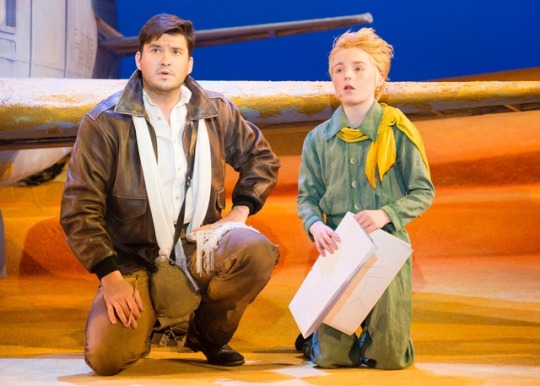
OPERA / 2017-2018
The Little Prince
OPEN REHEARSAL
Washington National Opera
Music by Rachel Portman Libretto by Nicholas Wright Based on the book by Antoine de Saint-Exupéry
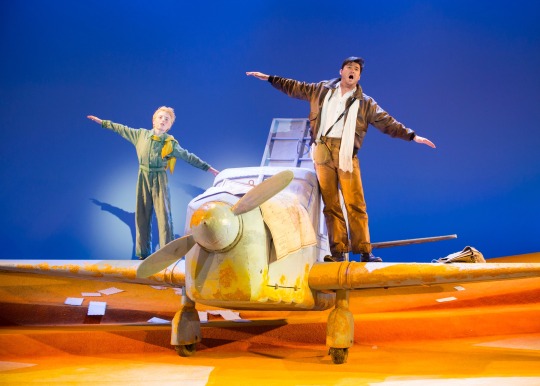
So, What’s Going On?
ACT I
A young pilot introduces himself to the audience. He explains how grown-ups never really understood him and that now, as an adult, he earns a living soaring through the sky. The stars sing to him as he glides through the air, but, despite the pleasant atmosphere, he suddenly loses control of his plane and crashes into the Sahara Desert.
The pilot looks over the damage and begins to try and fix the plane. But just as he grabs his tools, he’s interrupted by a small boy who curiously asks the pilot to draw a sheep. Though confused at first, the pilot comes to know the boy as “the Little Prince,” and, slowly, the prince reveals his unusual story.
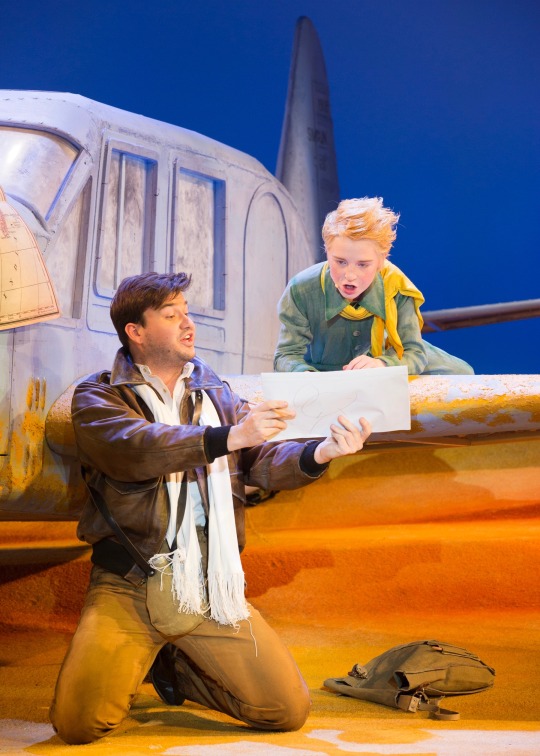
The pilot tries to impress the prince with his drawing skills.
Take a listen…
The pilot describes the Little Prince’s little planet (and its three mini volcanoes) in a film version of the opera from 2004.
vimeo
We learn the prince was once the proud owner of a tiny asteroid, where he cared for a lovely rose whom he adored but who was also very difficult to please. She challenged him to leave his home and gain more wisdom in order to be able to take care of her better, and so… he set out to visit some neighboring planets. During his travels he met several strange adults, including a king, a vain man, a drunkard, a businessman, and a lamplighter. After meeting these men, the Little Prince—not quite satisfied with what he’d discovered so far—decided to journey to planet Earth.
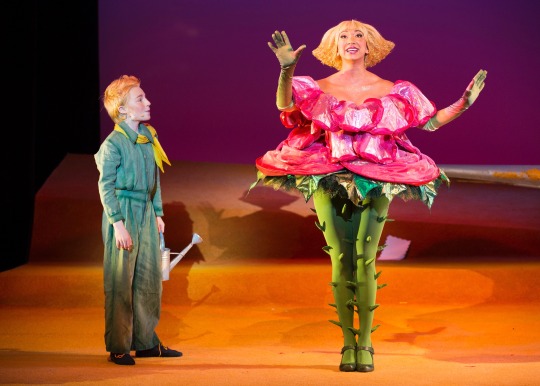
The prince admires his beautiful yet fickle and demanding rose.
ACT II
The prince continues his story while the pilot listens. On Earth, the prince says, he met a slithering snake who claimed that his deadly poison could “ease” all the prince’s worries. The Little Prince then encountered a garden full of roses and cried at the thought that his own rose might merely be one out of a million other common flowers.
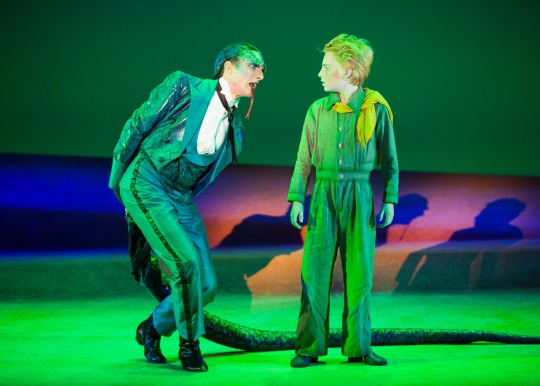
A scheming snake promises to cure the Little Prince’s homesickness.
The prince resumes his tale. Soon after meeting the roses, he adds, he was comforted by a friendly fox. The fox, who begged the prince to tame her and make her his own, gently explained that everything worthwhile is invisible and that such things cannot be touched, but can only be felt with the heart. She also told him that the bonds of love are what make all things—including ordinary flowers— uniquely special.
Take a listen… The fox asks the Little Prince to “tame” her by becoming her friend.
The pilot then cuts off the prince’s story, saying that the two of them will need water if they are to continue to survive in the desert. Exhausted, they travel to a spot directly beneath the prince’s planet (which sits high in the night sky) and discover a well. As they collect cool water from the crystal-clear well, the pilot realizes his friendly affection for the prince and begins to understand the fox’s message.
Still, the prince longs to return to his rose as he has promised. Will the tired and weary Little Prince make it home? Will the pilot be able to keep the prince’s lessons in his heart if the Little Prince disappears?

The pilot carries the fragile Little Prince across the Sahara in search of a well.
Who’s Who
The Pilot (baritone—a middle-range male voice) The Little Prince, a visitor from another world (boy soprano—a voice type that applies to young boys who sing in a high range that’s typical of female singers) The Rose (soprano—the highest female voice) A Fox (mezzo-soprano—a middle-range female voice) A Snake (tenor—the highest male voice) The Voice of the Water (soprano) The Inhabitants of Nearby Planets
Good to Know
Novelist Antoine de Saint-Exupéry (ahn-TWAN duh san-teg-zu-pey-REE)’s The Little Prince (or Le Petit Prince, in the original French) may have gone down in literary history as a timeless fairytale about life, love, loss, and the power of memory, but it was actually inspired by true events. Sort of. Saint-Exupéry, an accomplished artist and author, was—much like the narrator of his Little Prince story—a trained pilot. Yet despite his skills in the air and his years of experience working as a flying mail carrier and a reconnaissance pilot for the French government during World War II, Saint-Exupéry sadly suffered several plane crashes throughout his career.
One particular crash in 1935 landed him in the Sahara, where he and his co-pilot were left alone (with limited supplies) for several days. Saint-Exupéry witnessed several mirages while out beneath the desert sun and reportedly met with several imaginary creatures he had hallucinated. Years later, while in New York seeking sanctuary from war-torn Europe, Saint-Exupéry refashioned his own desert adventures into a fantastic tale about a lonely pilot whose life is given new meaning when he meets a remarkable little boy from outer space.
Loved by children and grown-ups alike for its simple language, vivid illustrations (also created by Saint-Exupéry) and enduring message of finding joy even in the saddest of times, The Little Prince has provided material for several films and stage works since its original publication in 1943. And when acclaimed film composer Rachel Portman decided to take a break from her successful movie career to create an opera suitable for children, she turned to Saint-Exupéry’s famous tale for inspiration, eventually realizing it was the perfect story for a kid-friendly operatic endeavor.
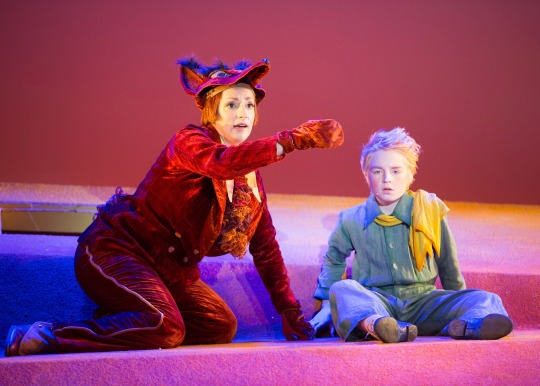
The fox tells the prince an invaluable secret.
Check This Out…
Children’s choruses, though they make appearances in some of opera’s best-loved works, aren’t used by operatic composers all that often. Why do you think Rachel Portman added a children’s chorus to The Little Prince? What function does the chorus play, if any? Can you come up with other instances in film, TV, literature, or theater where a chorus or group of people is employed in a similar way?
In Saint-Exupéry’s book, the prince has a special admiration for the lamplighter. In the opera, the prince joins this character in song, which is something he rarely does with the other “adults” in the story. Why do you think the lamplighter is given added significance by both Saint-Exupéry and Portman? Why do you feel the composer chose to have these two sing together?
The flute often plays alongside the prince’s voice. Why do you think the composer chose this instrument to accompany the Little Prince so frequently? Does the flute make you think of any particular aspects of the prince’s character?

The prince meets a king who loves to rule but never asks his subjects for anything unreasonable.
Think About This…
What to watch and listen for…
How the musical melodies rise and fall along with the characters’ feelings. (Example: The voice of the well water keeps getting higher and higher as the prince and the pilot enjoy a happy moment.) Does this technique help you sympathize with the characters and their experiences? Can you name other songs you’ve heard that use this same effect?
The overly-powerful and relentless music for the baobab (pronounced BEY-oh-bab) trees. Listen for the low-sounding instruments and the forceful drums that represent these destructive plants. What do the sounds remind you of? Do you think the greedy baobabs represented a specific concept, ideology, or group to Saint-Exupéry, who witnessed World Wars I and II?
How the prince and the pilot occasionally sing in short, choppy bursts with very few instruments, but also sing longer phrases that rise above the entire orchestra. Why do you think the composer uses these different styles? Do the styles remind you of anything? (Hint: Think about what it sounds like when you have a normal conversation vs. when you talk about something that excites you or gives you joy.)

The prince prepares to return “home.”
Take Action: An Invisible Top Ten
Perhaps one of the greatest lessons of The Little Prince is the fox’s mantra: “Anything essential is invisible to the eye.” Both the opera and Saint-Exupéry’s original story invite audiences to take the time to celebrate feelings rather than physical objects and to examine the tiny details that make our favorite people and most memorable experiences so important.
We challenge you to do the same.
Without naming any items that can be seen or touched, make a list of 10 things that inspire you, move you, make you happy, or give you a sense of purpose. Nothing is off limits (these can be moods or events you encounter every day or once-in-a-lifetime occurrences and emotions), but try to come up with thoughts and feelings rather than material gifts or techie gadgets. Your preferred model of smartphone? Leave that off the list. That sense of excitement you get when you’re visiting somewhere new on vacation? That’s more like it.
When you’re finished, share your list with family, friends, and fellow students. Ask them to make their own top ten as well. See if you can collect a bunch of top ten lists from people with a variety of different ages, backgrounds, and life stories. Gather your favorite entries and ask permission to post them on social media platforms like Facebook, Twitter, Snapchat or Instagram with the hashtag #invisibleessentials.
Explore More
Go even deeper with The Little Prince Extras.
–
All photos by Scott Suchman.
–
Major support for WNO is provided by Jacqueline Badger Mars.
David and Alice Rubenstein are the Presenting Underwriters of WNO.
WNO acknowledges the longstanding generosity of Life Chairman Mrs. Eugene B. Casey.
WNO's Presenting Sponsor

The Domingo-Cafritz Young Artist Program is made possible through the generous support of The Morris and Gwendolyn Cafritz Foundation, with additional funding provided by Judy and Billy Cox, Robert and Lynn Downing, Virginia McGehee Friend, Nicole Alfandre Halbreiner, Susan Carmel Lehrman, John & Mary Lee Malcolm, Michael F. and Noémi K. Neidorff and The Centene Charitable Foundation, Mr. and Mrs. Geoffrey P. Pohanka, Dr. Arthur and Mrs. Robin Sagoskin, Mr. Alan J. Savada and Mr. Will Stevenson, Mr. and Mrs. William E. Schuiling, Jr., Dr. and Mrs. Guillermo Schultz, Mr. and Mrs. Michael R. Sonnenreich, Washington National Opera Council, and The Women’s Committee of Washington National Opera.
Additional support for Events for Students is provided by A. James & Alice B. Clark Foundation; the Kimsey Endowment; The Morris and Gwendolyn Cafritz Foundation; Paul M. Angell Family Foundation; and the U.S. Department of Education.
Funding for Access and Accommodation Programs at the Kennedy Center is provided by the U.S. Department of Education.
Major support for educational programs at the Kennedy Center is provided by David and Alice Rubenstein through the Rubenstein Arts Access Program.
Kennedy Center education and related artistic programming is made possible through the generosity of the National Committee for the Performing Arts and the President’s Advisory Committee on the Arts.
© 2017 The John F. Kennedy Center for the Performing Arts
0 notes